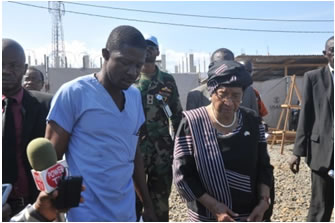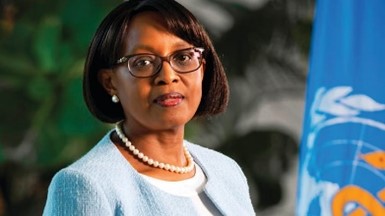Pres. Sirleaf tours ETUs

 President Ellen Johnson Sirleaf has expressed delight that most Ebola Treatment Units (ETUs) around Monrovia are experiencing a decline in patient intake; but warned Liberians to continue to follow the advice and measures specified by healthcare workers in order to break the transmission of the disease, as there are still hotspots and pockets in communities.
President Ellen Johnson Sirleaf has expressed delight that most Ebola Treatment Units (ETUs) around Monrovia are experiencing a decline in patient intake; but warned Liberians to continue to follow the advice and measures specified by healthcare workers in order to break the transmission of the disease, as there are still hotspots and pockets in communities.
“I feel very good. The people are working well – doctors, nurses, and other healthcare workers – they are all very vigilant and very efficient; more importantly, most of the ETUs don’t have patients,” an elated Liberian President told journalists.
President Sirleaf made the statement following a tour of several ETUs around Monrovia to assess conditions there, including constraints if any, and to thank healthcare workers, partners, and volunteers for their services to the country especially in the fight against the Ebola virus disease.
The President’s visit took her to treatment units at ELWA-II, Médecins Sans Frontières (MSF) ELWA-III, Ministry of Defense, the three ETUs under construction at the Samuel Kayon Doe Sports Complex, and the National Ebola Command Center in Sinkor.
At ELWA-II, Dr. Jerry Brown, head of the treatment facility, informed President Sirleaf that as at Tuesday, November 18, there were only 34 patients at that 100-bed facility. Fourteen patients were discharged on Monday, November 17, most of them from Rivercess County. Rivercess County experienced an outbreak recently and 24 suspected cases were transferred to his unit.
Dr. Brown confirmed that there is a decline in the number of Ebola cases as compared to previous weeks. “For the past one week, we’ve had a total of seven admissions on the average – two admissions a day, sometimes one or no patients,” he told the Liberian President. Dr. Brown’s ELWA-II has released over 200 Ebola survivors, the largest amount from any ETU in Liberia.
On plans to increase the survival rate of Ebola patients, Dr. Brown disclosed plans to shortly begin to extract plasma from Ebola survivors that will be discharged from the unit to treat infected patients with the serum at the ETU, noting that the World Health Organization has approved his treatment unit for the study.
[bsa_pro_ad_space id=1]
At the Médecins Sans Frontières (MSF) ELWA-III, President Sirleaf was met on arrival by the Project Coordinator Azaad Alocco, who confirmed that Ebola cases were declining. He said with over 140-bed capacity, they had only 25 patients at the unit.
Mr. Alocco proposed that with the reduction of the Ebola caseload in Monrovia, it would be appropriate to send human resources to communities and counties considered as hotspots to contain the disease, and not have cases referred to Monrovia. “We think our epidemiological analysis is that we should try to stop the contamination in the counties and hotspots, rather that transferring cases to Monrovia,” he recommended.
He disclosed that an MSF team is in Rivercess County along with the Centers for Disease Control and Prevention (CDC) to investigate a recent outbreak there and possibly establish an ETU or a transit center there rather than transport patients to Monrovia.
At the Ministry of Defense (MOD) ETU, which has been in operation for just two-weeks, the head of the unit, Dr. Soka Moses, informed President Sirleaf that already 16 patients have been admitted. However, he was about to discharge his first survivor.
The unit is being run by a Cuban staff of 20 doctors and 29 nurses, 177 Liberian staff; while a Swedish team is assisting with management, maintenance, and logistics. Before touring the MOD-ETU, the Liberian leader made stops at three ETUs under construction at the S.K. Doe Sports Complex. The World Food Programme (WFP) is constructing two 100-bed units each to be run by the International Rescue Committee (IRC) and the German Red Cross.
The People’s Republic of China (PRC) is also constructing a 100-bed treatment center expected to be opened shortly. Already, a 160-man medical contingent of the People’s Liberation Army (PLA) is Monrovia to operate the clinic as well as train local medical personnel. The final stop was at the National Ebola Command Center where she was led on a guided tour.
On each stop, President Sirleaf thanked the healthcare workers, partners, and volunteers for their services to the country. “We would like to appreciate all of you for making this big sacrifice to come and join us to fight this problem and for your service to the country,” she told everyone.















